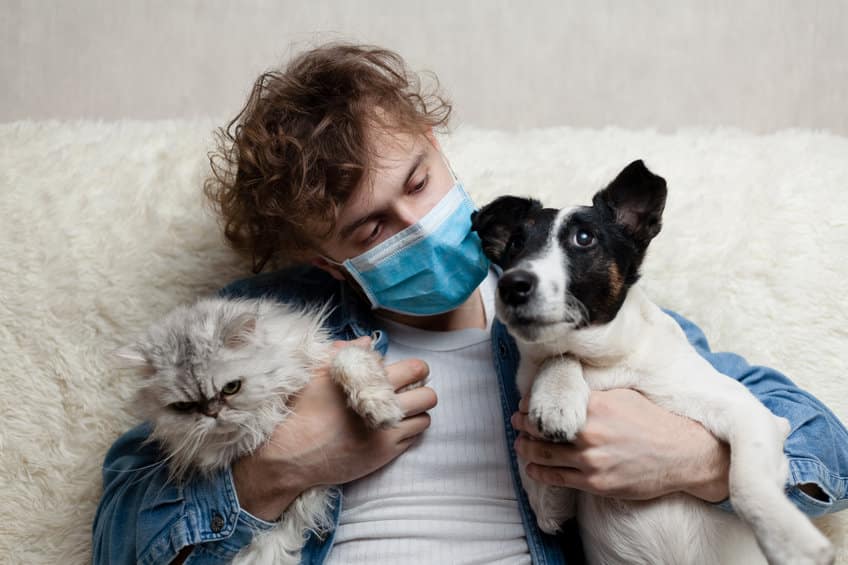By Kathy Driscoll –
Nearly 70 percent of U.S. households own at least one pet, usually a dog or cat. Americans do this because they generally just go nuts over their furry friends. It is not surprising then that this love means pets get really close to their owners. They hang out by the dinner table, cuddle up next to them on couches and chairs and even sleep in their beds. No one is denying that these furry ones offer companionship, stress relief and just plain joy. But is this entirely healthy, especially with covid variants popping up constantly and spreading like wildfires in the dry season?
Take a breath. The risk of getting COVID-19 from a cat or dog is minimal at best. In fact, both the CDC and the FDA are on the same page in assessing the risk. Likewise, a house cat or goofy pooch isn’t likely to transfer over a common cold to a person either. “The viruses that cause common colds, have, over time, become specifically adapted to living in people – not dogs,” noted Dr. Wesley Long, director of diagnostic microbiology at Houston Methodist. “This means that the common cold can’t be passed between you and your dog.”
This doesn’t mean dogs don’t get colds. In fact, they can get what’s known as “canine influenza.” But this flu is limited to dogs. Cats can also get hit with a fever, runny nose or cough from an influenza virus. One, in particular, called H7N2 normally circulates in birds, but has been detected in a few shelters, but authorities report that the chance of a cat passing this flu to a person is pretty low.
There is also no need to worry about the dreaded “cat flu”, a phrase people commonly use to describe infections in cats. This flu is actually connected to two different viruses, feline calicivirus and feline herpes virus. Neither virus can be transmitted to humans.
All of this comes as good news for pet lovers. Of course, there is a catch as always. The furry loved ones can spread problems to their owners. These “zoonotic diseases”—sicknesses that can be transmitted from animals to people—usually get passed around from pets via saliva or feces. On the pooch side, the transmission is likely to come from a dog bite or even a loving slumber. “It typically takes a bite or contact with an existing skin abrasion for the germs found in a dog’s saliva to cause illness in a person,” Long explained. “Most of the germs spread via a dog bite are part of a dog’s normal mouth flora. While it’s normal for a dog to have these germs in their mouth, it’s not normal for you to come into direct contact with them.”
While extremely rare, the transmissible illnesses and germs in question that can come from a dog bite include Rabies; Pasteurella, a germ that can cause tenderness, pain and swelling; Brucella, which causes fever and aches; and Capnocytophaga, which can cause a serious infection, possibly leading to sepsis and meningitis. But catching one of these illnesses usually requires a full-on bite or abrasion to start the infection, which isn’t likely to come from a pet. “This means you can continue to let your dog lick your face – if that’s your thing,” reported Houston Methodist.
Dog feces, unfortunately, may create other problems for owners. An infected dog may suffer from diarrhea and people cleaning up after their pets can be at risk if they don’t sanitize afterward. Houston Methodist warned that a range of bugs and parasitic diseases can be transferred over to humans through feces, including salmonella, campylobacter and giardia, among others, all of which can lead to gastroenteritis in people. Then, of course, there are fleas and ticks. These nasty little buggers can quite easily move from dogs to people and bring with them any number of problems including Lyme Disease, Rocky Mountain Spotted Fever and other tick-borne illnesses.
Cat owners also have to watch out for fleas and bacteria carried in the saliva of infected cats. And no one, of course, wants Cat Scratch Disease which comes from the transfer of a bacteria called Bartonella Henselae. This pass-off usually occurs from a cat scratch on the skin but can also be delivered from a cat bite or having kitty lick an open wound. Regardless of how it’s delivered, it’s unpleasant. Cat Scratch Disease can result in blisters on the infected area, but can also cause swollen lymph nodes, fever, headache, sore muscles and joints and fatigue in people. “People with compromised immune systems may suffer more severe consequences, including infections of the eyes, brain and heart,” researchers at the Cornell University College of Veterinary Medicine noted.
Cats, like dogs, can also infect people with Rabies and their feces can deliver problems like Salmonella and parasitic infections, such as Scabies. The range of potential pet-to-owner transferable illnesses is admittedly off-putting. Thankfully, regular check-ups, vaccinations and taking care to wash up after dealing with pet feces (or getting excessively slumbered) significantly reduce the risk for people.
“Before you become too alarmed, know that getting diseases from a pet is pretty uncommon and that you can prevent most of them with some very simple steps,” WebMD reported. “For example, teach children not to kiss pets or put their hands in their mouths after touching them. Frequent hand-washing and regular vet checks are two other great ways to help prevent a wide range of diseases from pets.”
So, go ahead. Cuddle up on the couch with your fur baby.














